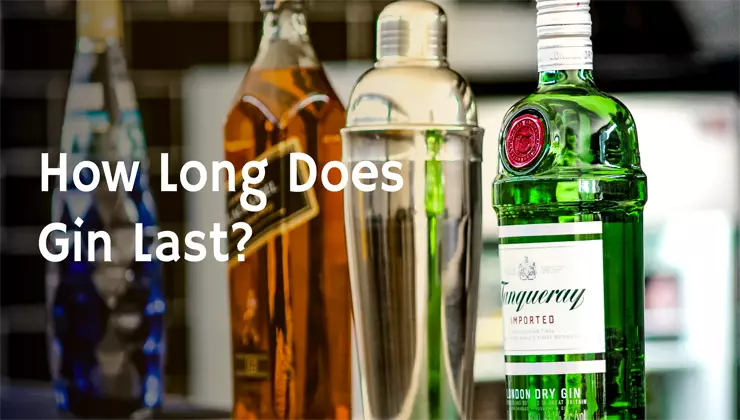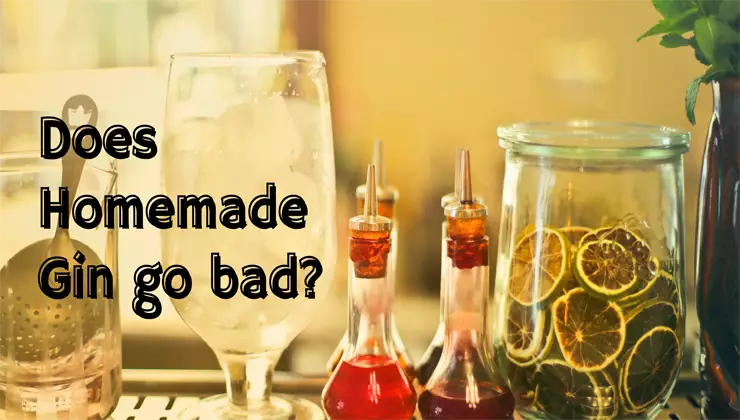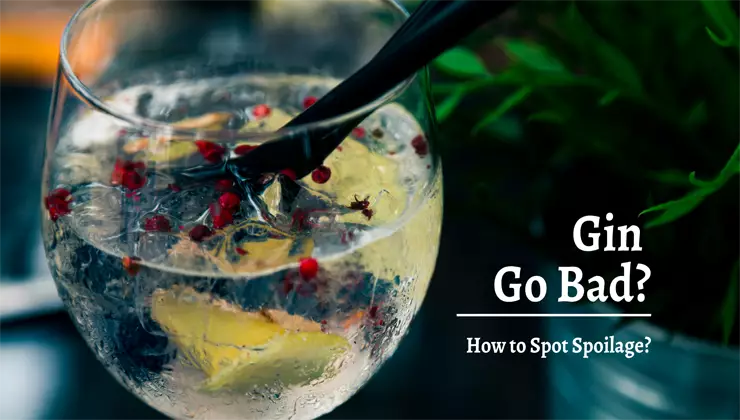Let’s start the question of whether the gin go bad by recognizing the gin. Gin is an alcoholic spirit that is typically made from a base of grain or malt and flavored with juniper berries and other botanicals.
Gin is typically bottled at a high alcohol content, usually around 40-50% alcohol by volume (ABV), which helps to preserve the flavor and prevent spoilage.
In general, gin has a relatively long shelf life and will not spoil as long as it is stored properly. However, over time, the flavor of gin can change, and it may lose some of its aroma and taste. This is particularly true if the bottle is opened and not properly sealed or if it is exposed to heat or light.
To ensure that your gin stays fresh and flavorful for as long as possible, it should be stored in a cool, dark place, away from light and heat.
The bottle should be sealed tightly when not in use. If you have opened a bottle of gin and don’t think you will be able to finish it within a few months, consider transferring it to a smaller bottle to minimize the amount of air exposure.
In general, unopened bottles of gin can last for several years, but once opened, it’s best to consume it within a year for optimal taste.
To help you navigate the world of spirits, we also have articles on whether Does Rum Go Bad, Does Campari Go Bad, Does Tequila Go Bad, Does Brandy Go Bad, Does Vodka Go Bad, Does Whiskey Go Bad, Does Triple Sec Go Bad, Does Champagne Go Bad, and Does Beer Go Bad. Let’s explore the specifics of Triple Sec and give you the essential information you need.
How Long Does Gin Last?
The shelf life of gin is relatively long and it can last for several years if stored properly. Unopened bottles of gin can last for several years. However, once a bottle of gin is opened, it should be consumed within 1 year for optimal taste.
The alcohol content in gin, usually around 40-50% alcohol by volume (ABV), helps to preserve the flavor and prevent spoilage. However, over time, the flavor of gin can change, and it may lose some of its aroma and taste. This is particularly true if the bottle is opened and not properly sealed or if it is exposed to heat or light.
It’s important to note that even if the gin has been stored properly, the quality of the gin may degrade over time, so it’s best to consume it within a year of opening it. If you notice any signs of spoilage such as off odors, discoloration, or cloudiness, discard the gin.
It is always recommended to check the expiration date on the label or the bottling date if no expiration date is available, as well as to pay attention to the appearance, smell, and taste of the gin before consuming it.

How To Tell If Gin Is Bad?
There are a few signs that can indicate that gin has gone bad:
- Off odors: If the gin has an unusual or off smell, it may have spoiled. This could include a musty, moldy, or sour smell.
- Discoloration: If the gin has changed color, it may have gone bad. It should be a clear liquid, if it is cloudy or has a yellowish color, it may have gone bad.
- Flavor: If the gin has an unusual or off-taste, it may have gone bad. This could include a sour, metallic, or chemical taste.
- Cloudiness: If the gin appears cloudy or milky, it may have gone bad.
- Presence of sediment: if there is any sediment in the bottle, it may indicate that the gin has gone bad.
It’s important to note that these signs do not necessarily mean that the gin is unsafe to drink. However, if you notice any of these signs, it’s best to discard the gin to avoid any potential health risks.
If you have any doubts about the gin’s quality, it is always recommended to discard it, even if it is within the shelf life, to avoid any potential health risks.
How long does Gin last open?
An opened bottle of gin can last for several months to a year if stored properly. To extend the shelf life of opened gin, it should be kept in a cool, dark place, away from light and heat. The cap should be tightly sealed after each use to prevent air from entering the bottle. Additionally, it is best to consume opened gin within a month or two, to ensure the best quality and taste.
How To Store Gin?
Keep it in a cool, dark place: The ideal storage temperature for gin is between 50-60°F (10-15°C). Avoid storing it in a place that is too warm, as heat can cause the gin to lose flavor and aroma over time.
- Store it upright: Gin should be stored upright to prevent the cork or cap from drying out, which can allow air into the bottle and spoil the gin.
- Keep it sealed: Once you open a bottle of gin, make sure to seal it tightly and store it in a cool, dark place. This will help to prevent oxidation and preserve the gin’s flavor and aroma.
- Transfer to a smaller bottle: If you have opened a bottle of gin and don’t think you will be able to finish it within a few months, consider transferring it to a smaller bottle to minimize the amount of air exposure.
- Avoid storing it in a freezer: While some people may recommend storing gin in the freezer, it’s not a good idea. The extreme cold can cause the gin to become cloudy and affect its flavor and aroma.
By following these guidelines, you can help ensure that your gin stays fresh and flavorful for as long as possible.
It’s worth noting that the shelf life of gin is relatively long and it will not spoil as long as it is stored properly. However, as previously mentioned, over time, the flavor of gin can change, and it may lose some of its aroma and taste.

Does Gin have an expiry date?
Gin is an alcoholic spirit that is typically made by distilling grain or a fermented grain mash, and then infusing it with juniper berries and other botanicals. It is typically bottled at a high alcohol content, usually around 40% alcohol by volume (ABV) or higher.
Because of its high alcohol content and lack of perishable ingredients, gin does not have an expiration date. As long as the seal is intact and the bottle is stored in a cool, dark place, the gin should remain safe to drink and retain its flavor indefinitely.
Is there any side drink that will spoil the taste of gin?
Gin is a versatile spirit that can be enjoyed in a variety of cocktails and mixed drinks. However, some mixers may overpower the delicate botanical flavors of gin, or clash with the juniper berries, which are the signature flavor in gin. Some mixers that are not recommended for gin include:
- Strongly flavored mixers such as tonic water with a high quinine content can overpower the flavors of gin.
- Sweet mixers such as grenadine or simple syrup, can clash with the juniper notes in gin.
- Fruit juices or syrups that are too sweet or too acidic, can also overpower the flavors of gin.
Instead, it’s recommended to pair gin with mixers that complement its flavors such as:
- Light tonic water, which allows the gin’s flavors to shine through.
- Dry vermouth, which adds a subtle sweetness and complexity to gin cocktails.
- Light, crisp mixers such as soda water, ginger beer, or lemon/lime juice.
- Aromatic mixers like Campari, Cointreau, or St-Germain Elderflower Liqueur which enhance the gin’s botanical profile.
Ultimately, it’s a matter of personal preference, so experimenting with different mixers and ratios can help you find the best combination for your taste.
Also, does the energy drink go bad?
Does Homemade Gin go bad?
Homemade gin, like commercially produced gin, is a distilled spirit and should not go bad as long as it has been distilled and stored properly. However, it is important to note that homemade gin may not have the same level of purity or flavor consistency as commercially produced gin.
When making homemade gin, the quality and freshness of the ingredients, as well as the distillation process, can affect the flavor and purity of the final product. If the ingredients are not fresh or the distillation process is not done properly, the gin may have off flavors or impurities.
Also, if homemade gin is not stored properly, it can become oxidized, which can affect its flavor and aroma. Homemade gin should be stored in a cool, dark place, away from light and heat, and in an airtight container to prevent oxidation.
It’s also important to keep in mind that homemade gin may not have the same alcohol content as commercial gin, which typically ranges from 40-47% alcohol by volume (ABV). Homemade gin may be less potent, so it’s important to adjust the serving size accordingly.
Overall, homemade gin can last for a long time if it’s been distilled and stored properly but it’s important to pay attention to the ingredients, the distillation process, and storage conditions to ensure the best possible taste and quality.

Questions about gin going bad
Would the gin be bad in the refrigerator?
If the gin remains for a long time in the refrigerator, it does not break, but there may be changes in taste. If you store your genie in the refrigerator, it should be safe to drink for several years as long as it is tightly closed and kept away from heat and light.
Even if the gin is in the refrigerator, if there is sedimentation or turbidity under the bottle, it is better to throw away the gall and get a new one.
Does the gin deteriorate under the sun?
Yes, if the gin drink is exposed to the sun or heat, it loses its quality and goes bad. Gin chemicals under the sun are exposed to changes and cause oxidation.
Source: tanqueray.com
More…
👉🏻 Does gold go bad?
👉🏻 Can beer go bad?
👉🏻 Can surge protectors go bad?
👉🏻 Do Bagels Go Bad?


I’m still learning from you, but I’m trying to reach my goals. I definitely liked reading all that is written on your site.Keep the stories coming. I enjoyed it!
Good article and straight to the point. I am not sure if this is actually the best place to ask
but do you folks have any ideea where to employ some professional writers?
Thanks 🙂 Najlepsze escape roomy
Someone essentially assist to make severely posts I’d
state. This is the very first time I frequented your web page and to this point?
I amazed with the research you made to create this actual post amazing.
Fantastic activity!